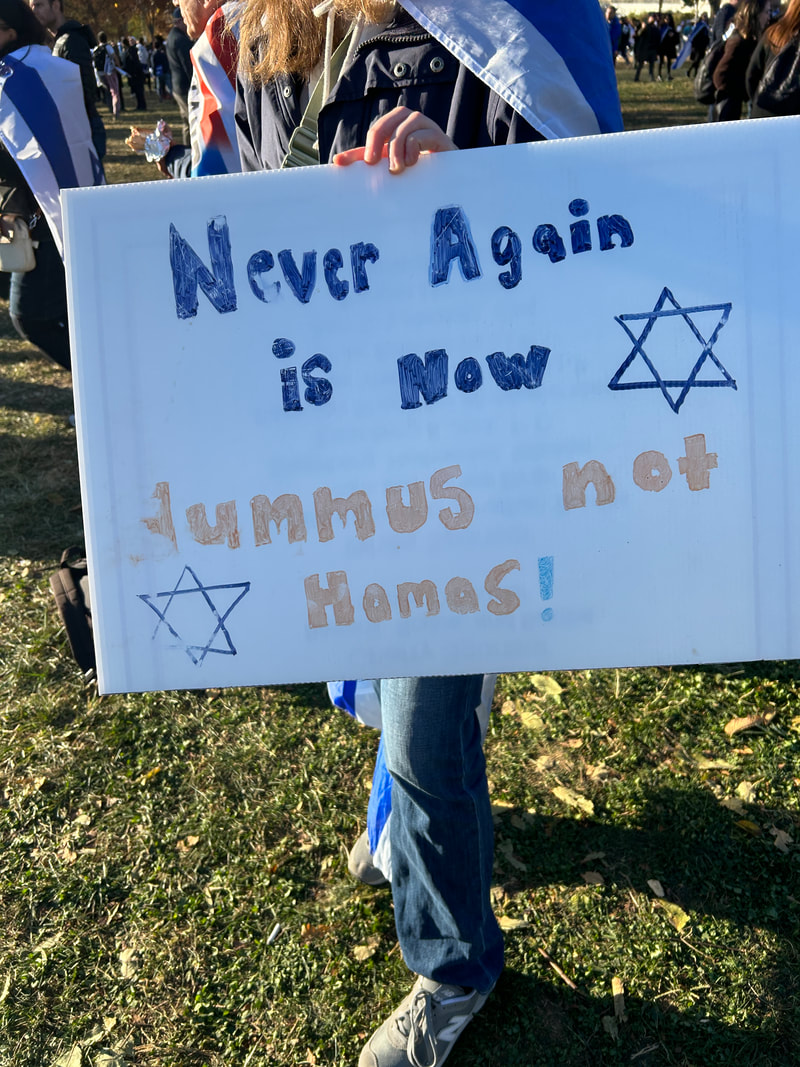|
[I shared this teaching as the guest darshan Shabbat Vayetze 5784 at Congregation Agudath Achim in Alexandria, VA. It was a joy to be visiting my friend and rabbinical school classmate, Rabbi Steven Rein. The Shabbat was two weeks after the March for Israel in Washington, DC. It's there that I took this picture.
I want to also acknowledge some of my feelings that I imagine may be shared by others around the release of some of the hostages in the last day. I feel some relief over the return of those hostages. I am also left wondering what’s next? I want to trust there is a plan for the remaining hostages and have hope that we will see them out of Gaza. And I will continue to hold my breath. I have been holding my breath for the 40 plus days, and I’m a bit unsure what will make me feel like I can exhale. Rabbi Mark Biller points out the way in which the Parsha starts with Jacob dreaming of angels moving up and down the ladder – they are distinct, separate from him. The parsha ends with the angels meeting him directly. The angels of God encountered him. Rashi explains the angels appear to help Jacob on his journey. Whereas at the beginning of the Parsha, Jacob stops and with the intention of resting – praying even – he encounters the angels in a dream. The end of the parsha, when Jacob is again on the move and still far from reaching his destination, is when he encounters the angels. There is a great deal to be said by someone else in another sermon about what happens in between throughout the parsha. I want to focus on these two verses and share one midrash. וַיִּפְגַּ֨ע בַּמָּק֜וֹם וַיָּ֤לֶן שָׁם֙ כִּי־בָ֣א הַשֶּׁ֔מֶשׁ וַיִּקַּח֙ מֵאַבְנֵ֣י הַמָּק֔וֹם וַיָּ֖שֶׂם מְרַֽאֲשֹׁתָ֑יו וַיִּשְׁכַּ֖ב בַּמָּק֥וֹם הַהֽוּא׃ “[Jacob] came upon a certain place and stopped there for the night, for the sun had set. Taking one of the stones from that place, he put it under his head and lay down in that place.” (Genesis 28:11) וְיַעֲקֹ֖ב הָלַ֣ךְ לְדַרְכּ֑וֹ וַיִּפְגְּעוּ־ב֖וֹ מַלְאֲכֵ֥י אֱלֹהִֽים׃ Jacob went on his way, and messengers of God encountered him. (32:2) What is this word וַיִּפְגַּ֨ע and what can it mean that it’s repeated in this way? Given that the text talks of these encounters, we can conclude Jacob was praying. He prayed when he stopped and rested, and he prayed on the move. He was constantly praying. The prayer is, one might say, what kept Jacob moving. Amidst the movement, the place where Jacob stopped is not at first named. It’s only a few verses later that the text tells us the name of the place. The word makom appears three times. The first and last time the word used is ba’makom, and in the middle it’s ha’makom. Or HaChaim[i] – written by R’ Hayyim ben Moshe who was a Talmudist and Kabbalist – says ba’makom means Jacob arrived to a place that was inhabited. He came to a place that had a name and though he did not recognize it, was familiar to others. This is why at the end of the paragraph we’re told that the town had previously been named Luz. What does Jacob do when he arrives there? In addition to the prayer, he rested. He takes a rock from the place, places it under his head and rests. The Or HaChaim explains that inasmuch as many dreams contain matters without significance, the Torah added the word ”והנה” to indicate that in this dream every detail is not only vivid and it is significant. Jacob had a complete recall of everything he dreamt and referred to each detail later. This is why ”והנה” is repeated before every segment of the dream. Jacob was, we might say, paying attention to the signs. Returning to the stones for another moment, Jacob took from the stones of the place – וַיִּקַּח֙ מֵֽאַבְנֵ֣י הַמָּק֔וֹם – implying there were multiple stones and from these he made his pillow. (28:11) When he awakens in verse 18, it says that he took the stone – וַיִּקַּ֤ח אֶת־הָאֶ֨בֶן֙. Evidently the many stones that Jacob first had were now one. Noting this inconsistency, Rashi (b. Chullin 91b) comments “the stones upon which Jacob rested his head fought over which would have the honor of serving as his pillow”. “The stones began quarreling with one another. One said, ‘Let the righteous man lay his head on me,’ and another one said, ‘Let him lay [his head] on me.’ Immediately God made them into one stone.” I like Rashi’s inventive approach and his desire to elevate the nature of the place where Jacob was staying. I also see this midrash as praising Jacob. Rashi is saying that by being there, Jacob brings kedusha – holiness – to the place. In the moments of fleeing his brother, perhaps feeling some abandonment of home and other family members and at the same time blessed and supported by some, Jacob is somewhere else. His body is in one place, and his mind in another. Other commentaries suggest that Jacob has been here before he just didn’t realize it. Perhaps this is the Torah’s first déjà vu moment. There is a multitude of emotions Jacob could be holding, and I am feeling like Jacob this Shabbat. Continuing to pray, looking for places to pray and hopefully have an encounter that will keep guiding us in the right direction. I hope that we will be reunited, experiencing the joining or strength of community that the rocks themselves symbolize when they give comfort to Jacob. [i] Rabbi Hayyim ben Moshe ibn Attar (1696-1743) was a Talmudist and Kabbalist wrote his commentary Or HaChaim.
0 Comments
|
Rafi CohenA parent, partner, teacher and coffee enthusiast, Rafi enjoys helping individual students and families find Jewish meaning in their lives. Archives
December 2023
Categories |

 RSS Feed
RSS Feed